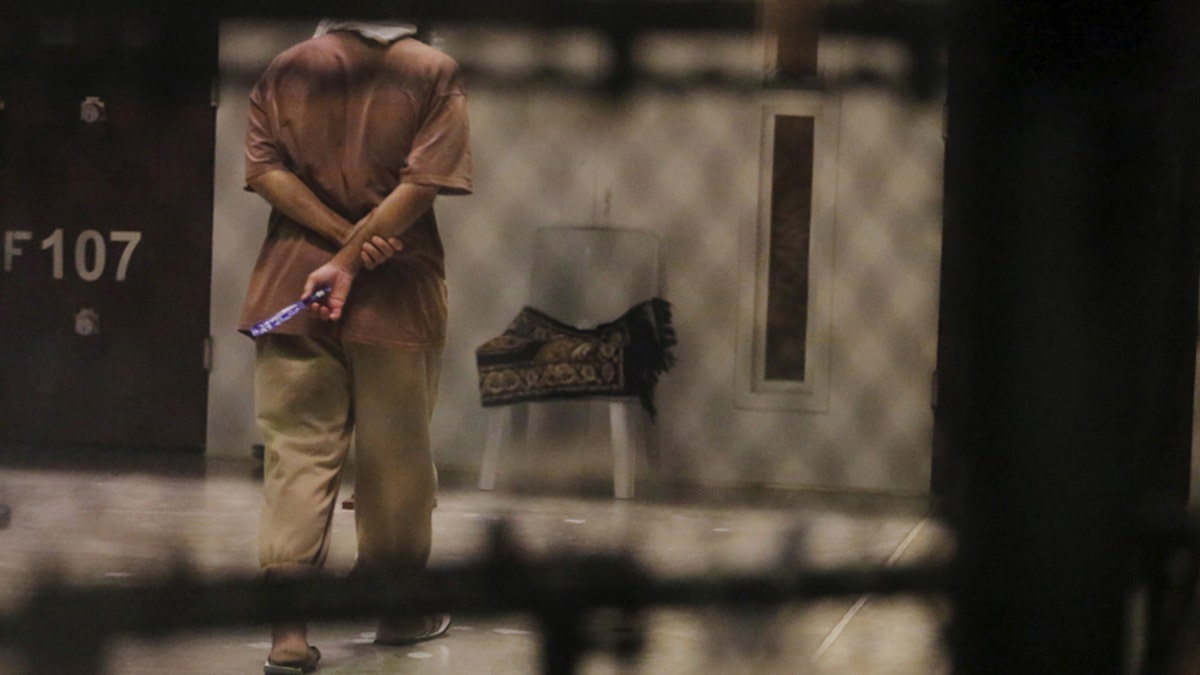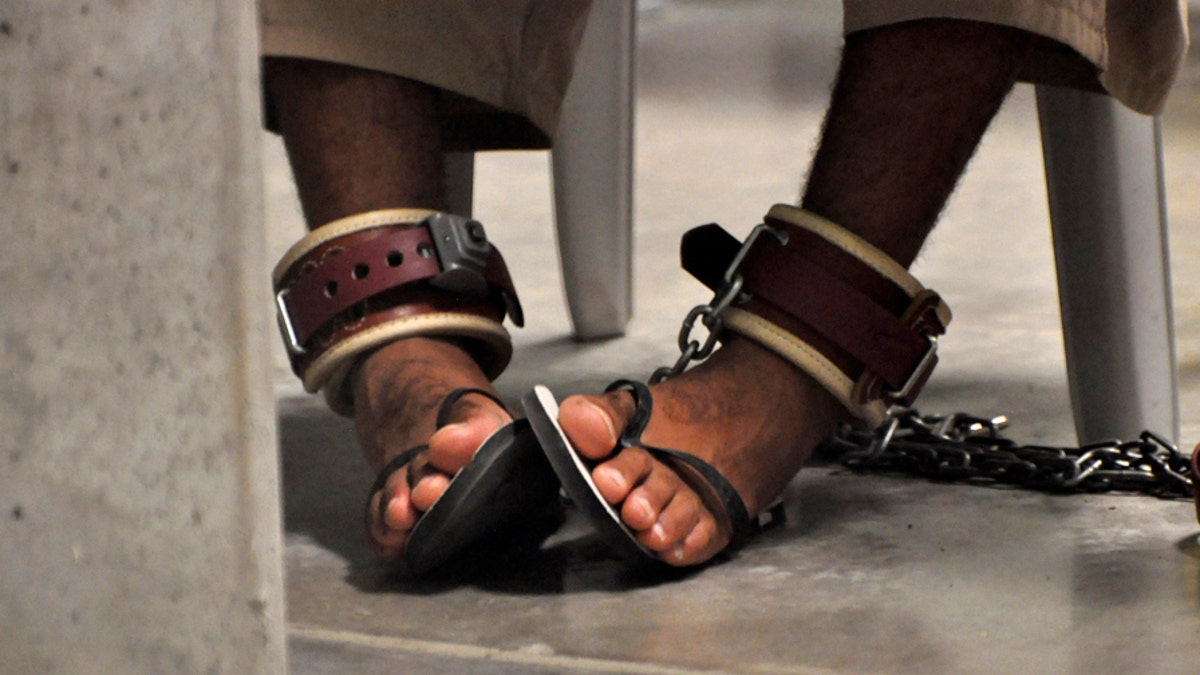
FILE PHOTO - Chain link fence and concertina wire surrounds a deserted guard tower within Joint Task Force Guantanamo's Camp Delta at the U.S. Naval Base in Guantanamo Bay, Cuba March 21, 2016. REUTERS/Lucas Jackson/File Photo - S1AETVRIRPAA
President Donald Trump recently ordered Guantanamo Bay to remain open indefinitely, making good on his tough campaign rhetoric on the embattled military prison.
Trump’s executive order also mandated that Secretary of Defense James Mattis put together a task force and conduct a review of policies regarding individuals captured during a battle, including their potential detention in Guantanamo Bay.
Mattis recently told reporters that it’s his objective to send foreign-born nationals captured on the battlefield to their home countries for trial.

The prison, opened by former President George W. Bush in the wake of the September 11, 2001 attacks, has long been the target of international and domestic ire. (REUTERS)
“We're gathering up hundreds now of detainees,” he said. “The important thing is that the countries of origin keep responsibility for them. How they carry out that responsibility -- there's a dozen different diplomatic legal or whatever ways, I suppose. But the bottom line is we don't want them going back on the street.”
Perhaps the most well-known Guantanamo Bay prisoner is Khalid Shaikh Mohammed, who has been charged with war crimes for his alleged role as the architect of the Sept. 11, 2001 attacks. Former CIA Director Gen. Michael Hayden publically admitted to waterboarding Mohammed.
Ali Hamza Ahmad Suliman al Bahlul, the former propaganda chief for Al Qaeda, is another notable prisoner who has been charged and convicted of war crimes. He has been held at Guantanamo for over 16 years.
Majid Khan is the only known legal U.S. resident to be held at the prison; he’s been charged with war crimes and held for over 11 years. Khan’s torture, detailed in the Senate’s 2014 Torture Report, included being deprived of sunlight and rectally force-fed.
The executive order was met with swift condemnation by Rep. Adam Smith, D-Wa., the ranking Democrat on the House Armed Services Committee. He said the prison is an “international eyesore that undercuts our national security.”

The prison cost taxpayers about $445 million in 2015, according to a Defense Department plan detailing the closure of the prison. (REUTERS)
The prison, opened by former President George W. Bush in the wake of the September 11, 2001 attacks, has long been the target of international and domestic ire. Beyond “persistent and credible” reports of torture from United Nations human rights groups, Guantanamo Bay has been the subject of numerous lawsuits regarding the illegal detention of suspected terrorists.
“A review of detaining policy is long overdue, and it’s a good step,” Alberto Mora, a senior fellow at the Carr Center for Human Rights Policy, told Fox News. “… I think that seeing Guantanamo Bay as the repository for our principal high-value targets in the war on terrorism is too restrictive.”
Mattis’ carte blanche to develop a task force and recommend action on Guantanamo Bay, granted by the executive order, could open the door to the potential shuttering of the prison, Mora said. Such a move would finally realize the ambitions of former President Barack Obama, who ordered the prison closed on his second day in office in January 2009.
“Mattis has a free hand to make recommendations as he sees them,” Mora said. “I hope the president would be open-minded to review all of Mattis’ recommendations.”
In an emailed statement, a Department of Defense spokesperson said the agency, along with its partners, will use the 90-day review to determine a disposition for individuals captured on the battlefield.
The military prison, stationed at the U.S. Naval Station in Cuba, currently holds 41 prisoners, all of whom have been there for over a decade. According to Human Rights First, a nonprofit, nonpartisan advocacy organization, the Trump administration plans to indefinitely detain 23 Guantanamo prisoners without charge or trial.
The prison cost taxpayers about $445 million in 2015, according to a Defense Department plan detailing the closure of the prison. Costs to detain 80 prisoners could be lowered by an estimated $180 million if they were moved to a U.S.-based facility, according to the report.
“We’re using 2000 soldiers to guard 41 prisoners,” Mora said. “The expense is astronomical. It provides no additional security than provided by a supermax.”
Supreme Court Justices have sided with plaintiffs in all four detainee rights cases brought before them, one of which helped establish their right to habeas corpus – or the right to challenge illegal detention before a judge.
A total of nine prisoners have died at Guantanamo. Six of those deaths were ruled suicide, according to the U.S. Southern Command, the joint command in charge of the prison.
Guantanamo detainees alleged that during hunger strikes, prison personnel would force feed them by sticking tubes down their nose and into their stomach, pumping liquid in food to keep them alive.
Human Rights Watch, an international humanitarian organization, reported that detainees were forced to sit in their own excrement and endure sexual humiliation from female interrogators.
John Bellinger III, a former George Bush administration attorney and senior fellow with the Council on Foreign Relations, said the president’s executive order is more politically symbolic than substantive.
“It’s two things,” Bellinger said. “It’s consistent with campaign statements he made about keeping Guantanamo open, and second, to undo Obama administration initiatives, particularly President Obama’s signature initiatives.”
He said the future detention of prisoners at Guantanamo, especially captured ISIS fighters, is a “ticking legal bomb,” which he believes will lead Mattis to recommend that no new prisoners be sent there.
“Why would the Secretary of Defense or the Justice Department want to send someone to Guantanamo, where they will immediately be given the right to challenge their detention,” Bellinger asked.
The legal battle centers on the right of habeas corpus granted to Guantanamo detainees in the Boumediene v. Bush case. The Supreme Court ruled that enemy combatants have the right to challenge their detention as unlawful before a judge. These cases, Bellinger said, can take years to resolve.
“What’s happened here is that Guantanamo has really turned out to be a legal headache with the Justice Department,” Bellinger said. “With almost every detainee, they are challenging their detention with years of litigation in federal courts.”
Mora, who also served as military council for former President Bush after 9/11, said the prison as currently structured doesn’t serve the national interest. He still believes the U.S. needs to be able to detain people captured on the battlefield, but only temporarily and an ideal policy would be one that efficiently transfers individuals to their home countries, something Gen. Mattis is currently pursuing.
Trump’s executive order has stirred waters internationally, opening the possibility for countries to demand “no Guantanamo guarantees,” which Bellinger said were effective during the Bush administration.
“I think other countries would certainly be unhappy if the president were to send new people to Guantanamo,” Bellinger said. “Right now there’s more of a wait and see attitude to see if the president’s order is more of a political statement than it is an actual change in policy.”




